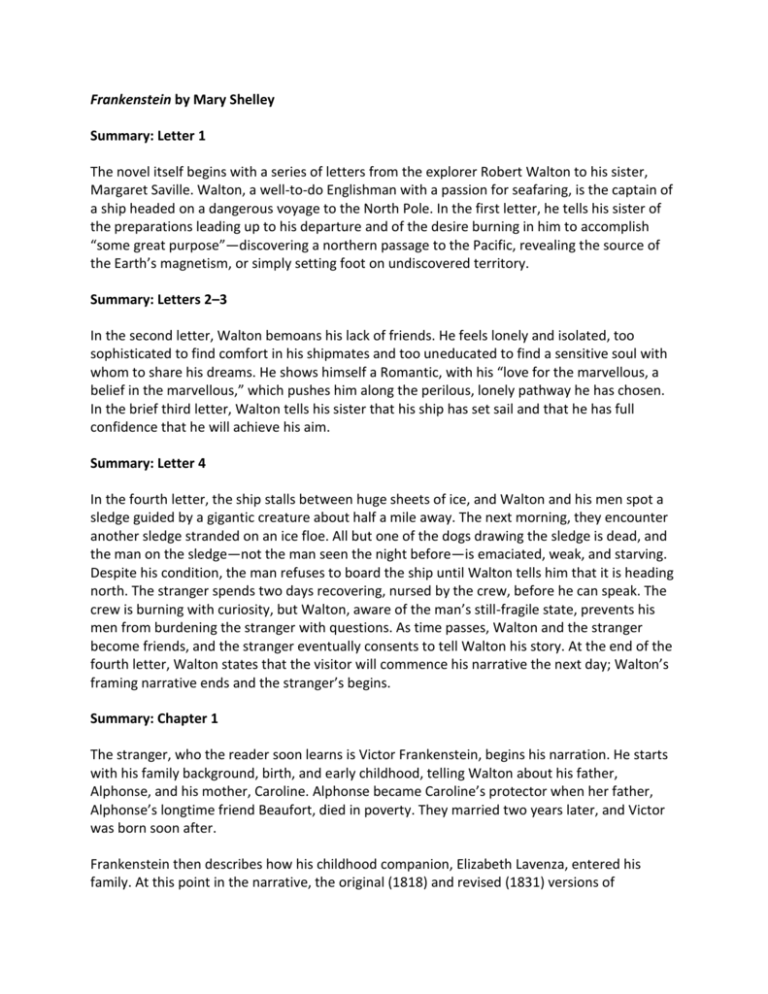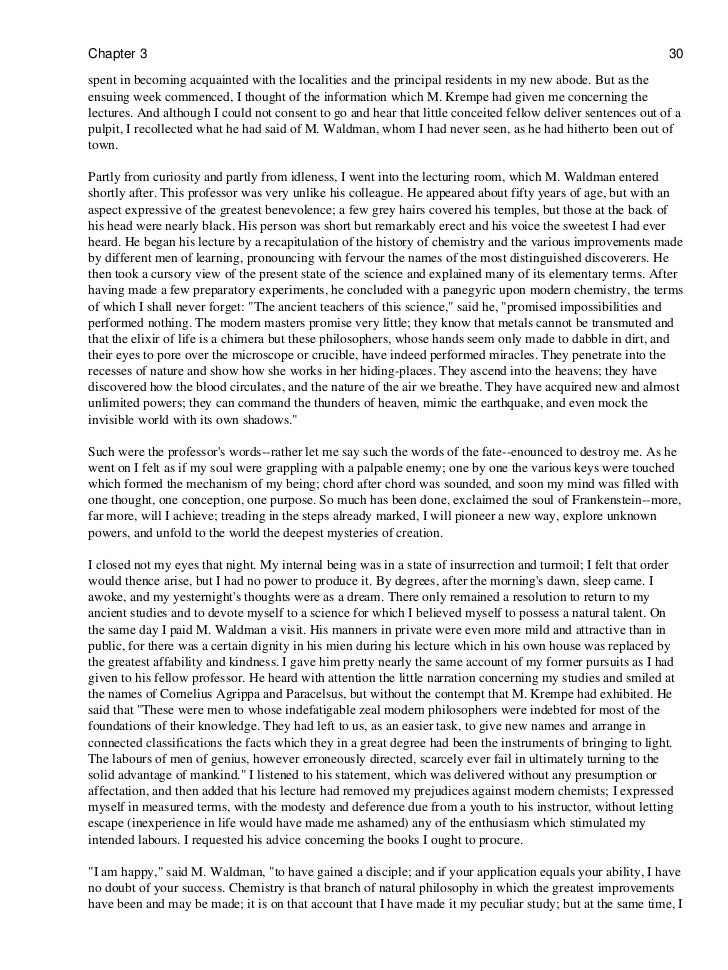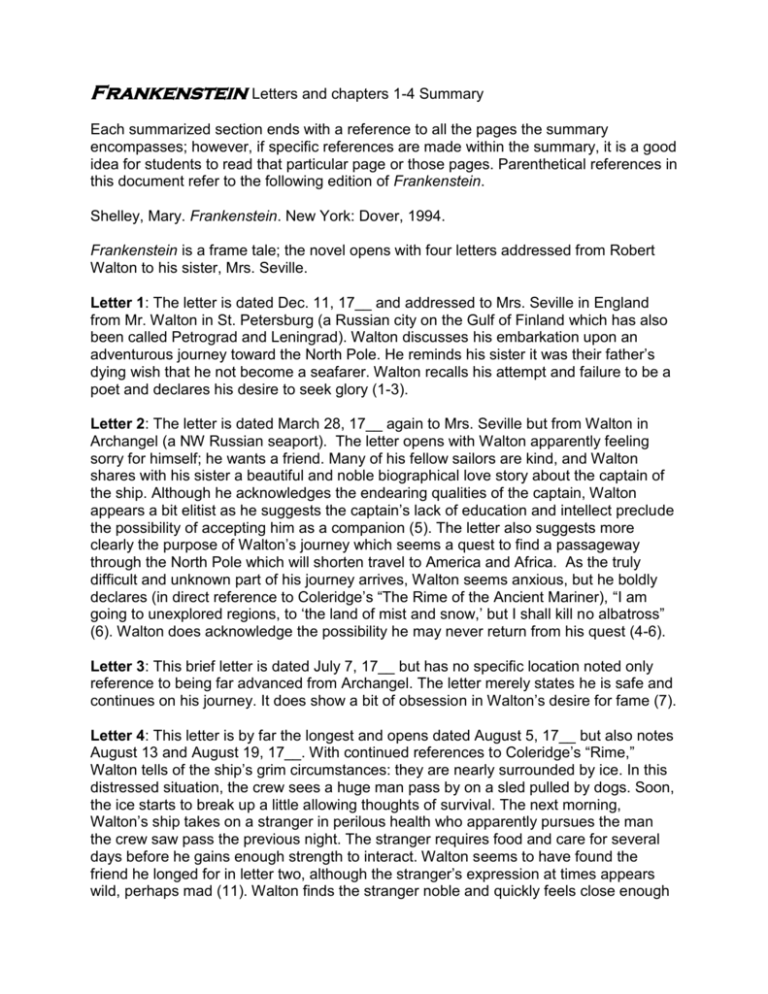Chapter 3 Summary Of Frankenstein
Frankenstein by Mary Shelley is a captivating novel that explores the themes of creation, ambition, and the consequences of unchecked scientific pursuits. In Chapter 3, readers are introduced to Dr. Victor Frankenstein's journey into the realm of scientific discovery as he delves into the creation of life. This chapter summary provides a detailed overview of the events and themes explored in Chapter 3 of Frankenstein.
Chapter 3 Summary of Frankenstein
In Chapter 3 of Frankenstein, Dr. Victor Frankenstein becomes consumed by his ambition to unlock the secrets of creating life. He spends countless hours studying various scientific disciplines and experiments, determined to bring his groundbreaking ideas to fruition. Finally, after relentless dedication, Victor successfully creates a living being using a combination of chemistry and alchemy.

Although initially ecstatic about his creation, Victor quickly realizes the grave implications of his actions. The creature he brings to life is not the beautiful, idealized being he had envisioned, but a twisted and monstrous form. Overwhelmed by fear and horror, Victor flees from his creation, abandoning it in the hopes of escaping the consequences of his actions.
The aftermath of Victor's creation is a pivotal moment in the novel, as it sets the stage for the moral and ethical dilemmas that pervade the story. Victor is haunted by the guilt of his actions and the impact they have on not only his own life but also the lives of those around him. This chapter serves as a turning point in the narrative, as it marks the beginning of Victor's downward spiral into despair and obsession.
Exploring the Importance of Chapter 3
Chapter 3 of Frankenstein is a crucial chapter that delves deep into the themes and motifs that permeate the novel. Below are three key aspects addressed in this pivotal chapter:
1. The Ambition of Victor Frankenstein

Chapter 3 explores Dr. Victor Frankenstein's insatiable ambition and his relentless pursuit of scientific discovery. Victor's desire to unlock the secrets of creation drives him to push the boundaries of science, ultimately leading him to create the creature. This theme highlights the dangerous consequences of unchecked ambition and serves as a cautionary tale about the potential perils of scientific advancement without consideration for ethics and responsibility.
2. The Consequences of Playing God
In Chapter 3, Mary Shelley introduces the concept of playing god and the repercussions of Victor's actions. By attempting to create life, Victor assumes a role that is reserved for a higher power. The consequences of this hubris are evident in the creation of the monstrous creature. Shelley raises important questions about the limits of human knowledge and the potential dangers inherent in attempting to master the mysteries of life and death.
3. The Exploration of Identity and Otherness
Chapter 3 also delves into themes of identity and otherness, with the creation of the monster serving as a physical manifestation of societal fears and prejudices. The monster, rejected by its creator and ostracized by society, is a poignant symbol of the alienation experienced by those who are deemed different or abnormal. Through the character of the creature, Shelley explores the complexities of humanity and the moral responsibility we have towards others.
Frequently Asked Questions About Chapter 3 Summary of Frankenstein
1. Why is Chapter 3 important in Frankenstein?
Chapter 3 is important in Frankenstein as it marks the moment of Victor Frankenstein's successful creation of life. It introduces key themes that shape the narrative, such as the consequences of unchecked ambition and the exploration of identity and otherness. Additionally, Chapter 3 sets the stage for Victor's moral and psychological decline, driving the plot forward.
2. What are the main themes explored in Chapter 3?
The main themes explored in Chapter 3 of Frankenstein include ambition, the dangers of playing god, and the exploration of identity and otherness. These themes are crucial in understanding the moral and ethical dilemmas faced by Dr. Victor Frankenstein and the impacts of his actions.
3. How does Chapter 3 contribute to the overall narrative of Frankenstein?
Chapter 3 serves as a turning point in the narrative of Frankenstein. It marks the moment of Victor Frankenstein's successful creation of life and sets in motion a chain of events that ultimately leads to his downfall. The chapter explores essential themes and motifs that recur throughout the novel, paving the way for the development of complex characters and the examination of ethical and moral dilemmas.
Similar Topics to Chapter 3 Summary of Frankenstein
If you found the Chapter 3 summary of Frankenstein intriguing, you might also be interested in exploring the following related topics:
- The Role of Ambition in Frankenstein
- Ethical Considerations in Scientific Advancement
- Exploring the "Other" in Gothic Literature
33+ Chapter 11 Frankenstein Summary - RakeshTosia
 Image Source : rakeshtosia.blogspot.com
Image Source : rakeshtosia.blogspot.com The Open Boat Summary - Trending US
 Image Source : trendtopusa.blogspot.com
Image Source : trendtopusa.blogspot.com frankenstein shelley novel shmoop creature literary essays shelly
Frankenstein
 Image Source : www.slideshare.net
Image Source : www.slideshare.net frankenstein chapter
Frankenstein Book Summary Pdf - BOOKS CRU
 Image Source : bookscru.blogspot.com
Image Source : bookscru.blogspot.com Frankenstein – Chapter 5 - YouTube
 Image Source : www.youtube.com
Image Source : www.youtube.com chapter frankenstein
Frankenstein Chapter 14 Summary Storyboard Von Bb3c3c48
 Image Source : www.storyboardthat.com
Image Source : www.storyboardthat.com Frankenstein Letters And Chapters 1-4 Summary
 Image Source : studylib.net
Image Source : studylib.net frankenstein
Frankenstein By Mary Shelley Summary - Eckman
 Image Source : studylib.net
Image Source : studylib.net frankenstein shelley studylib victor eckman
33+ chapter 11 frankenstein summary. Frankenstein shelley studylib victor eckman. Frankenstein shelley novel shmoop creature literary essays shelly. Frankenstein chapter. Frankenstein – chapter 5